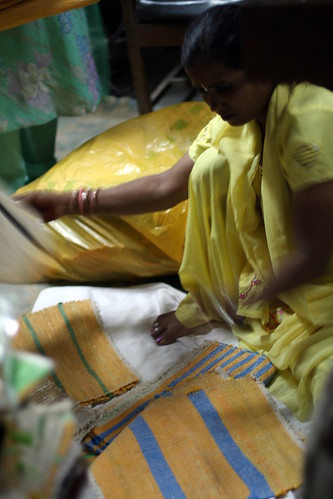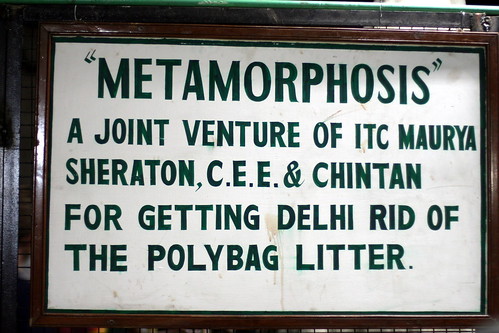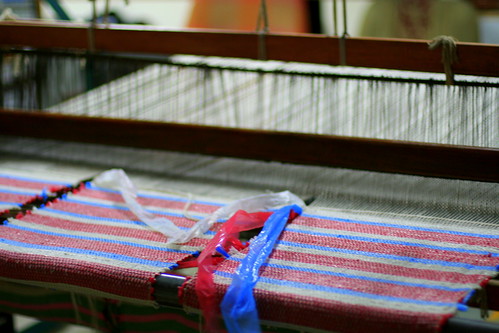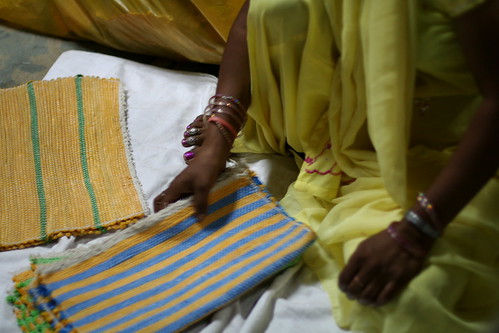What do we do with plastic bags? We use them to carry our groceries home, to gather up our household trash, and eventually we throw away and create more trash. In many states in the U.S., grocery chains and other corporations are encouraging the reduction of plastic bag use by providing reusable totes– some free, some for purchase. In India, the production and discarding of plastic bags is now supposed to be heavily regulated, thanks to The Delhi Degradable Plastic Bag (Manufacture, Sale and Usage) and Garbage (Control) Act, 2000. Yet, despite this legislation, I still see thousands of plastic bags in the garbage piles lining the streets of the city.
Before I get further into this subject, let me back track.
So far I’ve been in Delhi for five days, three of which have been spent orientating myself to the tasks I’ll be working on here in the office at Chintan. During these first few sessions, I have been trying to wrap my head around the structure of the recycling sector as it exists in Delhi and in other various municipalities across India. The picture that is beginning to appear in my mind is, as Chintan’s director Bharti Chaturvedi puts it, of the waste picker as “one of the poorest persons in urban India subsidizing the life-styles and consumption of the richest.”
The waste pickers operate within and depend upon an extremely unstable and hazardous industry, the informal waste management sector. While their services to the municipality saves Delhi estimates of greater than six hundred thousand rupees per day, the workers and their children suffer from high job insecurity, harassment from police, social invisibility, health-threatening conditions, and for many, a life-long lack of socioeconomic mobility. The waste pickers are not legally recognized by the government, and thus they are without protection from unsanitary conditions, from abuse by city policemen, and from job loss due to the privatization efforts of the Delhi municipal government.
So far, I’m only into my second day of work here with Chintan. I have so much more to learn. As I attend meetings with staff members, visit hotels and malls which Chintan has partnered with to provide contracts for waste pickers, and eventually visit the waste picker enclaves to meet them in person, my understanding of how each person and position interconnects will become clearer. Yet it will take some time before I have a clear understanding of the overarching social system in which Chintan and the waste pickers are working, and of the obstacles that they face in trying to achieve their goals on both small and large-scale levels.
On that note, I digress back to musing over plastic bags.
On Monday afternoon, I was able to visit the site of “Metamorphosis,” a small project that is in the beginning stages of coordination between Chintan and some of the women waste pickers they have joined with. In the dimly lit basement garage of a nearby ITC Maurya Sheraton Hotel, a small area is portioned off by chain-link fence segments and curtains. In this space we met two women sitting behind a large weaving loom, finishing up their work for the day. A small girl, a daughter belonging to one of them, alternated between playing on the chairs and hiding shyly behind her mother’s sari as Kiran explained the project to us. The women are specially trained waste pickers who, through Chintan’s arrangement with the Sheraton and the Center for Environmental Education (CEE), are allowed to come here and turn discarded plastic bags into a new source of livelihood– designer handbags. After thoroughly cleaning and sanitizing the plastic, the bags are cut into strips and separated into large sacks of various colors. 
The loom, like one you might see used to create tapestries, shawls and other traditional handicrafts, is then used to weave the strips into flat sections of different sizes that eventually become a range of stylish purses, shoulder bags, and clutches that the women sell. Placemats and door hangers with pockets for keys, mail, or other items are also available for purchase.
The Metamorphosis project is still fairly new, and only five women are involved in the process at one time- three of whom, in this particular group, are now on leave. Kiran explained that she tries to rotate different women from the waste picker group into the project so that all of them eventually will receive training to participate in the venture. Before coming here, I had learned of a similar project run by Conserve India that has actually been able to market their bags in designer boutiques in cities like New York. Checking back to their website yesterday, I found that Conserve has even expanded their product line to now include a wider range of bags, sandals, and other accessories like make-up bags.
This is essentially where Kiran and Chintan are trying to go with this operation– however there are still many obstacles to overcome before they can reach the level of success which Conserve has realized.
When we visited on Monday, the site was not currently in full operation. The cleaning station was not in use, and some of the curtains that designate the space for the women were taken down from the fence sections. Kiran explained that there had been some “issues” with the hotel administration which needed to be cleared up before full operation could be resumed. Even after asking a couple of times, I’m still a bit unclear as to what this entailed.
Marketing the products is another aspect that needs major help. As of yet, the bags have only been sold to CEE and to the government’s Department of Environment. Kiran is hoping to eventually attain greater funding, scholarships for the women, and a presence on the Internet where the Loom products can be seen and purchased by a wider audience. Chintan will be looking at using tools like YouTube and Ebay, as well as micro loan organizations like Kiva, to aid in this expansion.
 A sign hung outside of the loom “walls” designates this space for the project amidst rows of shiny motorbikes and expensive cars in the garage basement of the Sheraton.
A sign hung outside of the loom “walls” designates this space for the project amidst rows of shiny motorbikes and expensive cars in the garage basement of the Sheraton.
 This loom is a new source of income for several of the women waste pickers– and hopefully will become a means of empowerment as the Loom project grows.
This loom is a new source of income for several of the women waste pickers– and hopefully will become a means of empowerment as the Loom project grows.

A weaver displays the placemats she has made from plastic bags collected during waste picking.
To view all the photographs from our visit to Metamorphosis, visit my Flickr account here.
Today is Day 3 of work, so I’m quite behind Paul in getting oriented to my goals here for the summer and establishing a more frequent blog, but fear not dear readers.. much more to come soon!
Posted By Mackenzie Berg
Posted Jun 11th, 2008



4 Comments
Paul Colombini
June 12, 2008
Great blog! Don’t worry, you will probably know by the end of this week about as much as I’ve learned in the last three 🙂
devin
June 15, 2008
Awesome blog Mackenzie. I love all of the visuals on your site! Keep up the good work and enjoy Delhi for me, I’m so jealous!
Tait Robinson
June 21, 2008
Hi Mackenzie,
I was checking out one of your fellow Fellows blog – Djanita Topcagic’s – and the AP website and saw your name thinking you were in the field operations class i helped run last quarter. Djanita’s a good friend of mine, also from DU, we were at GSIS/Korbel together. Well you’re obviously not that Mackenzie, but oh well!
You’re doing some cool stuff in a country i’ve spent a good bit of time in myself….and working with Indians, whom i’ve developed more than a bit of a soft spot for over time. So, the recycling, wastepicker issues seem fascinating. And with any luck, you’ll get to go outside the cities a bit as well. But i’m both surprised and heartened to see that recycling/environmental issues/programs are making headway over there. So you and Paul are doing very cool, important work, and i’ll look forward to checking out your blogs as well as djanita’s (she’s in dhaka)!
To this end, i have several friends from delhi. One of them was at school with djanita and i, sumani dash, she graduated i believe with an MA in Development and after spending a year in DC is now back in Delhi working for the Aspen Institute as its Program Executive. They do more leadership development and management seminars i think, but she’s said they like to work with all sorts of groups from private entities to ngos….the point being, i dunno what sorta overlaps there might be, but i’d be happy to put you and paul (though i haven’t written on the Terrapins’ blog yet!) in touch with her if you like (i’ll probably send sumani the text of your blog to gauge her impression as well). and i know you’re probably busy enough as it is, but perhaps someone else in Chintan might be interested, and even if it goes nowhere, no worries at all. so shoot me an email if you’re interested: trobins4@du.edu
I’m abroad myself this summer, but in ghana, so i seriously envy the food your’re getting over there!!
Well good luck with everything, have fun and stay well!
Tait Robinson